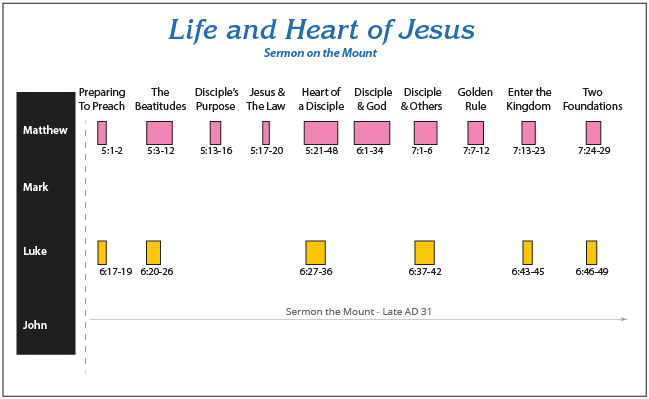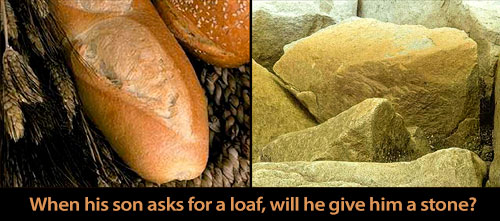
The next part of Jesus’ Sermon on the Mount does not seem to have any connection to His last instruction about unfair judgment of others (Matthew 7:1-6). This passage, Matthew 7:7-12, appears to be about prayer at first. We will see shortly that Jesus has more on His mind. Jesus begins with instruction about prayer and our heavenly Father, but His goal is not to teach us something new about prayer. He talks about our heavenly Father’s response to our requests, but He ends with another issue. He starts by talking about “asking,” “seeking,” and “knocking” and ends with a discussion that appears to have nothing to do with asking, seeking, and knocking. Are you curious? Jesus’ next topic is a set-up for a surprising conclusion.
Ask, Seek, & Knock
Jesus introduced His next topic with the following words,
Ask, and it will be given to you; seek, and you will find; knock, and it will be opened to you. Matthew 7:7 (NASB)
Jesus’ words are simple. If you ask for something, it will be given. If you seek something, you will find it; and if you go knocking, the door will be opened. The words are simple, but the message is not. The Greek word that Jesus used for “ask” is aiteo. It refers to someone who is making a request of a superior. It reminds me of a young puppy in the presence of his master – a shy, little puppy.

Jesus painted a picture of an inferior person asking a superior for something. Most of us have asked someone for something and felt some fear. We were concerned that our request might not be fulfilled. We were not sure that our request would be granted. This is the meaning of the word “ask” that Jesus used.
In Jesus’ illustration we are the shy, little puppy that is asking, seeking, and knocking. If we are actively asking, seeking and knocking, we will not be disappointed. But before we go any further, we must be honest with ourselves. We know that this is not true. We have asked. We have sought. We have knocked, but we have not always received.

Other Statements
Before we move on to verse 8, we want to discover what the rest of the New Testament says about asking, seeking and knocking in relation to answered prayer. So get ready for a quick ride through the New Testament.
Must Believe. In Matthew we discover that Jesus had approached a fig tree and discovered that it had no figs, He commanded the tree to no longer bear any fruit and immediately the leaves on the tree withered. Then the disciples asked, “How did this occur?” Jesus answered with the following statement,
And all things you ask in prayer, believing, you will receive. Matthew 21:22 (NASB)
This time Jesus did not just say, “Ask, and it will be given to you.” He told us that we had to believe. Most of us would never ask for something from someone if we did not believe that the person could give it to us. So Jesus told His disciples that they needed to believe God could give it to them.
Not Lose Heart. In Luke 18:1 Jesus encouraged His disciples to not lose heart when they pray.
Now He was telling them a parable to show that at all times they ought to pray and not to lose heart . . . Luke 18:1 (NASB)
Yet sometimes we pray, and we do lose heart. We conclude that the superior being, God, is not interested in us and does not care. We are not sure He will answer. So Jesus encourages us to ask and trust.
Ask In Jesus’ Name. Jesus also encouraged His disciples to ask in His name when they pray.
Whatever you ask in My name, that will I do, so that the Father may be glorified in the Son. If you ask Me anything in My name, I will do it. John 14:13-14 (NASB)
The phrase “in Jesus’ name” is not a set of magic words that someone should use to get what they want. Instead, it is a request to Jesus and through Jesus to God the Father. Jesus desires to fulfill our requests.
Abide In Jesus & Study The Bible. In the next verse Jesus adds some more conditions for answered prayer.
If you abide in Me, and My words abide in you, ask whatever you wish, and it will be done for you. John 15:7 (NASB)
First, we must abide in Jesus. That is, we must believe in Jesus Christ. This is more than believing that Jesus existed. It means that we believe He existed, that He was God, and that He died for our sins. One who believes He is God will yield to Him. How else should the creature respond when he or she really understands that Jesus is his or her God? Non-believers should not expect God to grant their requests when they do not believe in Him and ignore Him.
Second, Jesus told His disciples that those who are studying His words, the Bible, will receive whatever they request. He was talking about something more than casual reading of the Bible, reading a book about the Bible, or reading one’s daily devotions. His statement includes serious Bible study – digging in and discovering what each verse really means and absorbing yourself in His Word.
Yielding To Him. God also tells us that He answers the prayers of those who are striving to obey Him.
Beloved, if our heart does not condemn us, we have confidence before God; and whatever we ask we receive from Him, because we keep His commandments and do the things that are pleasing in His sight. 1 John 3:21-22 (NASB)
God is not talking about perfect obedience. If He was, none of our prayers would be answered because none of us are perfect. He is talking about men and women who are seeking and striving to be good. Psalm 66:18 warns us that if we “regard iniquity,” that is, are sinning and do nothing about it, God will not hear our prayer.
According To His Will. 1 John 5:14 adds another condition to prayer.
This is the confidence which we have before Him, that, if we ask anything according to His will, He hears us. 1 John 5:14 (NASB)
Here we discover that we must ask according to His will. The entire Bible describes God’s will for us. Yet, the New Testament lists some specific things as His will. The first is found in 2 Peter 3:9.
The Lord is not slow about His promise, as some count slowness, but is patient toward you, not wishing for any to perish but for all to come to repentance. 2 Peter 3:9 (NASB)
That is the most important of His wills. Here are some others: 1) be sexually pure (1 Thessalonians 4:3-8), 2) be filled with the Holy Spirit (Ephesians 5:17-18), 3) be willing to suffer for righteousness (2 Timothy 3:12; 1 Peter 4:19), 4) give thanks always (1 Thessalonians 5:18); and 5) submit to civil government (1 Pet. 2:13-15). God calls us to obey Him; and when we ask according to His will, He will grant our requests.
Wrong Motives. Sometimes our prayers are not answered because they are self-centered, and our motives are wrong. That is the message in the book of James.
You ask and do not receive, because you ask with wrong motives, so that you may spend it on your pleasures. James 4:3 (NASB)
This makes sense because self-centered prayers are not according to His will. Many of our prayers are self-centered. Prayers that are focused on others are usually not self-centered.
Summary. These passages tell us that God answers the prayers of those who: believe in Him, study the Bible which is the very words of God, ask in Jesus’ name, pray according to God’s will, believe He can answer our prayers, and do not lose heart. What type of person is described by these statements? What kind of person would this individual be? What would you or I be?
The answer to our questions is found in James 5:16. The person is a righteous man or woman.
The effective prayer of a righteous man can accomplish much. James 5:16 (NASB)
The prayer of a righteous man or woman accomplishes much. The book of Proverbs tells us that a righteous person is one who is teachable (Proverbs 9:9), has compassion for his/her animal (Proverbs 12:10), hates lies (Proverbs 13:5), does the will of God (Proverbs 2:20), and has faith in God (Galatians 3:11). How does God respond to the righteous?
The curse of the LORD is on the house of the wicked, but He blesses the dwelling of the righteous. Proverbs 3:33 (NASB)
The LORD will not allow the righteous to hunger, but He will reject the craving of the wicked. Proverbs 10:3 (NASB)
What the wicked fears will come upon him, but the desire of the righteous will be granted. Proverbs 10:24 (NASB)
The righteous has enough to satisfy his appetite, but the stomach of the wicked is in need. Proverbs 13:25 (NASB)
The LORD is far from the wicked, but He hears the prayer of the righteous. Proverbs 15:29 (NASB)
It is the righteous man or woman whom God hears. It is his or her prayer that He answers because the righteous man or woman who believes in Him, studies, and obeys the Bible, asks in Jesus’ name, prays according to God’s will, believes He can answer our prayers and does not lose heart. Do you want to be a righteous man or woman?
Receive, Find, & Opened
The Sermon on the Mount has been a long description of the righteous characteristics of a citizen of the kingdom. So when Jesus makes His statement about asking, seeking and knocking, and then repeats it in the next verse, Matthew 7:8, He is talking about a citizen of the kingdom, a righteous man or woman, who is asking, seeking and knocking.
For everyone who asks receives, and he who seeks finds, and to him who knocks it will be opened. Matthew 7:8 (NASB)
Sometimes, however, God’s response to the prayer of even a righteous man is, “No!” We do not always know God’s will. That was true for the Apostle Paul in 2 Corinthians 12:7-12. Yet, it is also true that God may choose to answer the prayer of an evil man for God does not completely ignore evil men such as King Nebuchadnezzar (Daniel 4).
There is a true story of a man who was shipwrecked and stranded on a small uninhabited island. The man built a hut and ate what he could from the sea and the island. He watched for days and months for help. One day he was horrified when his hut caught fire and burned up in flames. He asked himself, “What more could happen?” The next day his desire for help was answered. A ship sailed to the island and picked him up. He was surprised and asked the captain what had brought the ship to the island. The captain answered, “We saw your smoke signal.” This true story illustrates the fact that God sometimes allows us to be disappointed in order for something better to happen.
Bread, Stones, Fish, and Snakes
Then Jesus asked the following questions,
Or what man is there among you who, when his son asks for a loaf, will give him a stone? Or if he asks for a fish, he will not give him a snake, will he? Matthew 7:9-10 (NASB)

The answer to Jesus’ questions is obvious. Most human beings will not give their children a stone if they ask for bread, nor will they give them a snake if they ask for a fish. The answer is obvious and now Jesus is ready to make His point.
If you then, being evil, know how to give good gifts to your children, how much more will your Father who is in heaven give what is good to those who ask Him! Matthew 7:11 (NASB)
Did you notice that Jesus said we are “evil”? The Greek word that Jesus used has the idea of one who is evil and continues to be evil. Jesus included every human being who was listening to Him. He also included you and me. We are sinners, and the pattern of our life is evil. Only by the power of the Holy Spirit in our life can we be otherwise. Compared to God who is holy, we are evil.
In one episode of “St. Elsewhere,” a television show, grandma and a little boy were walking on a seashore. The boy walked out into the water and was swept out to sea by a wave. The grandma quickly prayed and miraculously the boy was washed up on the sand. He was soaked and his hair was out of place. The grandma quickly prayed again, looking to heaven and said, “You know, Lord, he did have a hat!”
The grandma cared for the little boy just as many other grandmothers do. If we who are evil know how to give good gifts, how much more will God give us good gifts since He is holy?

Conclusion
Has this section been all about prayer? If you think that Jesus’ goal and purpose was to teach us about prayer, listen to the next verse,
In everything, therefore, treat people the same way you want them to treat you, for this is the Law and the Prophets. Matthew 7:12 (NASB)
The key word is “therefore” because it refers us back to what has occurred before this verse, starting with verse 7. It also refers back to verse 11 where we, who are evil, know how to give good gifts, and to the truth that our holy God gives us good gifts.
We ask, seek, and knock and God responds to our requests. Therefore, if we know how to give gifts, then shouldn’t we give good gifts? Even more, God gives us an example that we should follow and He gives us good gifts. Therefore, because we know how to give good gifts and God’s gives us good gifts, then we should treat others as we would want them to treat us.
This entire section has been a call for us to treat others just as God treats us. God responds with compassion and we should too! Righteous men and women do!
Do for others what you would like them to do for you. This is a summary of all that is taught in the law and the prophets. Matthew 7:12 (NLT)